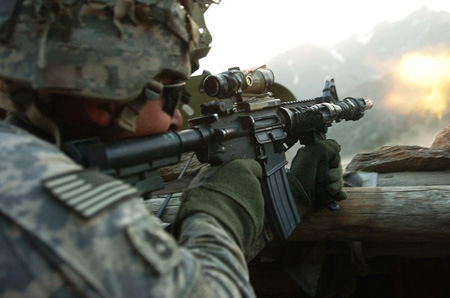 “If you know the one thing that causes people to commit suicide, please let us know because we don’t know” – General Peter Chiarelli
“If you know the one thing that causes people to commit suicide, please let us know because we don’t know” – General Peter Chiarelli
In the aftermath of Vietnam War, 150,000 veterans from that war committed suicide, meaning more soldiers died after the war than from the actual war itself, say experts. In 2010, more enlisted US soldiers committed suicide (468) than died in combat (462), as reported by mainstream media watchdog Project Censored, which has designated military suicides as the media’s top-censored story for 2010 and 2011. In November, the VA said 18 veterans a day are taking their own life.
The suicide trend among American troops and veterans is repeating itself. But are the reasons behind today’s military suicides different than what happened after the US left Vietnam?
A growing number of soldier advocates, mostly parents of deceased soldiers, have tried to tell the military and Congress what may be behind today’s suicide surge.
Some believe the military and the VA are over medicating troops and veterans with a combination of antidepressants and antipsychotics. This is a drug cocktail that has tragic side effects, such as sudden cardiac arrest, and because the military and Big Pharma are desperate to keep these side effects a secret, a convenient explanation to get both off the hook is “suicide.”
Stan White, a retired assistant principle from West Virginia, has lost two sons to war during the past decade. His eldest son Robert died in combat; his son Andrew made it home, but died suddenly in his sleep. The father remains patriotic, but this doesn’t mean he is blindly devoted to those who ordered his sons to war.
He believes the politicians who sent Robert and Andrew to Afghanistan and Iraq are sold-out to the London-based pharmaceutical giant AstraZeneca, which has convinced the military to treat post traumatic stress disorder (PTSD) with the antipsychotic Seroquel. White claims Seroquel, when prescribed with antidepressants, is a dangerous mix that killed his son Andrew and continues to kill American troops and veterans.
As of this November, White has compiled a list of nearly 300 soldiers and veterans who were taking Seroquel and antidepressants, and suddenly died or, as the military ruled, committed suicide, such as Army Private Timothy Ryan Alderman of Florida, who was found dead in his barracks in 2008.
“Sudden cardiac death was confirmed by an ECG done at the scene,” says Dr. Fred Baughman, an outspoken critic of psychiatry. “Inexplicably, military officials de-classified his death and reversed the cause, calling it instead, a ‘suicide’.”
White mailed the list of 300 soldiers and veterans – along with research showing mixing antipsychotics and antidepressants drugs increases the risk of sudden cardiac death – to both the Senate and House’s veteran affairs committees. White also mailed it to First Lady Michelle Obama, and she was gracious in passing his concerns on to the VA, he says. But when it comes to those who could truly make a difference, White says Congress has hardly lifted a finger.
“They didn’t say anything at all. No one from Congress has ever contacted us. Never,” he says. “I think AstraZeneca is so strong and has so much power, that no one can speak out. Money talks. I truly believe AstraZeneca and other Big Pharma companies have control over Congress.”
Indeed, according to OpenSecrets.org, from 2002 to 2011, the London-based AstraZeneca had 14 lobbying firms give $35 million to Congress and other federal agencies, including the Department of Health and Human Services, which oversees the Food and Drug Administration, the office that approves and regulates prescription drugs.
Coincidentally, since 2001, the VA’s spending on Seroquel increased more than 770 percent, becoming the agency’s second-biggest prescription drug expenditure since 2007. The annual Seroquel bill for the US military is at $125 million, according to the Associated Press.
Paying-to-play is an obvious AstraZeneca strategy to push their drugs, but putting influential people on the pay-roll must be another. In 2009, Matthew J. Friedman, the executive director of the US Department of Veteran Affairs National Center for PTSD, was on the pay-roll of AstraZeneca and publicly promoting Seroquel.
So maybe it shouldn’t come as a surprise the US military’s Central Command or CENTCOM, which runs the Afghanistan conflict, allows troops the choice of deploying with a 180-day supply of Seroquel in low doses to treat insomnia, even though the Food and Drug Administration has not approved use of the antipsychotic as a sleep aid.
“This has been a big boost for AstraZeneca,” says White about the military’s apparent need for Seroquel, which is a gold mine, as it makes $4 billion annually.
Why the US military continues to over-prescribe antipsychotics and antidepressants for PTSD is an easy answer, he adds. “Because it’s the cheapest way to deal with the problem,” he said. “What we need is less medication and more peer counseling and professional counseling.”
John Lasker is a freelance journalist from Columbus, Ohio.
